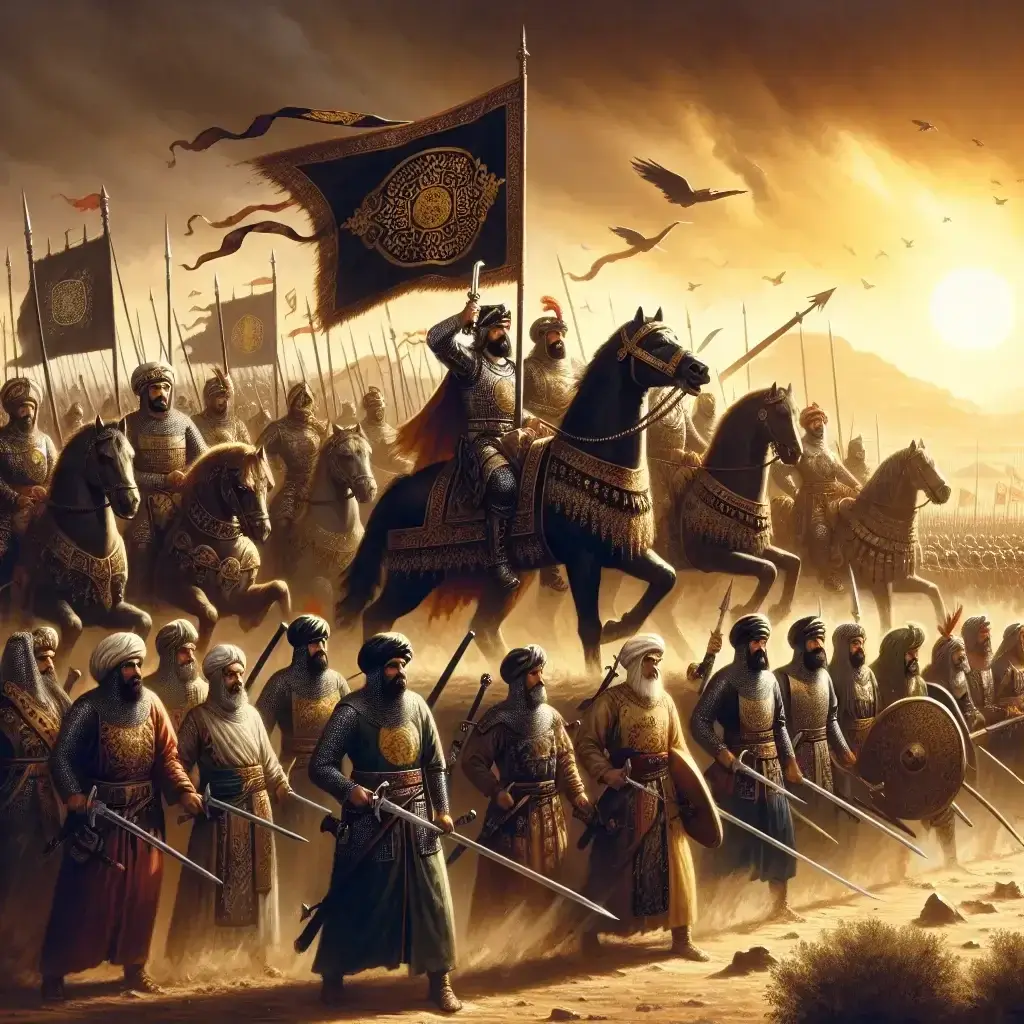Understanding Ashura: The Historical Significance, Religious Observances, and Reflections on Karbala

Ashura is a day of great significance in the Islamic calendar, observed on the 10th day of Muharram, the first month of the Islamic lunar calendar. This day holds profound importance for Muslims worldwide, symbolizing both a moment of historical tragedy and spiritual reflection. As we delve into the essence of Ashura, we explore its historical context, religious significance, lessons from the events it commemorates, and the diverse ways it is observed across the Muslim world.
Table of Contents
Introduction: Historical Background of the Battle of Karbala

The Battle of Karbala, fought on the 10th of Muharram in 680 AD, is one of the most pivotal events in Islamic history. This battle occurred in the plains of Karbala, present-day Iraq, and was a confrontation between a small group of supporters and family members of Imam Husayn ibn Ali (رضي الله عنه) and the much larger army of Yazid ibn Muawiya, the Umayyad caliph. This battle was not merely a fight over political power but a profound struggle between the forces of justice and tyranny.
The Martyrdom of Imam Husayn (رضي الله عنه)
Imam Husayn (رضي الله عنه), the grandson of the Prophet Muhammad (ﷺ), stood against Yazid’s corrupt rule, which had deviated from the principles of Islam. Despite being vastly outnumbered, Imam Husayn (رضي الله عنه) and his followers chose to fight rather than submit to oppression. The battle ended in tragedy with the martyrdom of Imam Husayn (رضي الله عنه) and his companions, who were brutally killed. The aftermath saw the women and children of his household taken captive.
Impact on Islamic History
The martyrdom of Imam Husayn (رضي الله عنه) at Karbala became a symbol of resistance against tyranny and oppression. His stand is remembered as an act of ultimate sacrifice and steadfastness in the face of overwhelming odds. This event has left an indelible mark on Islamic history, inspiring countless movements for justice and serving as a timeless reminder of the importance of standing up for righteousness.
Related Article About Islamic History : Brave Women in Islamic History
Religious Significance (Fasting on Ashura)

Prophetic Tradition
The tradition of fasting on Ashura dates back to the Prophet Muhammad (ﷺ). It is narrated in Hadith that the Prophet observed the Jews of Medina fasting on this day to commemorate the day when Allah saved the Children of Israel from their enemy, and Moses (Musa) fasted in gratitude. Upon learning this, the Prophet Muhammad (ﷺ) said:
“قَدِمَ النَّبِيُّ صَلَّى اللَّهُ عَلَيْهِ وَسَلَّمَ الْمَدِينَةَ فَرَأَى الْيَهُودَ تَصُومُ يَوْمَ عَاشُورَاءَ، فَقَالَ: مَا هَذَا؟ قَالُوا: هَذَا يَوْمٌ صَالِحٌ، هَذَا يَوْمٌ نَجَّى اللَّهُ بَنِي إِسْرَائِيلَ مِنْ عَدُوِّهِمْ، فَصَامَهُ مُوسَى. فَقَالَ: فَأَنَا أَحَقُّ بِمُوسَى مِنْكُمْ، فَصَامَهُ وَأَمَرَ بِصِيَامِهِ” (صحيح البخاري 2004)
Translation: “The Prophet (ﷺ) came to Medina and saw the Jews fasting on the day of Ashura. He asked, ‘What is this?’ They replied, ‘This is a righteous day; it is the day when Allah saved the Children of Israel from their enemy, so Moses fasted on this day.’ The Prophet (ﷺ) said, ‘We have more right to Moses than you,’ so he fasted on that day and commanded [the Muslims] to fast.” (Sahih al-Bukhari 2004)
Virtues and Rewards
Fasting on Ashura is highly recommended in Islam. The Prophet Muhammad (ﷺ) stated that fasting on this day expiates the sins of the previous year. This act of worship is seen as a means of seeking Allah’s forgiveness and earning spiritual rewards. The simplicity of fasting reflects the humility and gratitude that are central to the Islamic faith.
Prophetic Hadith on Ashura
Numerous Hadiths emphasize the importance of Ashura and the act of fasting on this day. The Prophet Muhammad (ﷺ) said:
“For fasting the day of Ashura, I hope that Allah will accept it as expiation for the year that went before.” (Sahih Muslim 1162)
These Hadiths underscore the spiritual benefits of observing this fast and the opportunity it provides for Muslims to seek forgiveness and purify their souls.
Lessons and Reflections
Lessons from Karbala
Sacrifice and Steadfastness
The story of Karbala is one of unparalleled sacrifice and steadfastness. Imam Husayn (رضي الله عنه) and his companions chose to stand firm in their beliefs and principles, even at the cost of their lives. Their willingness to sacrifice everything for the sake of justice and truth serves as a powerful lesson for all Muslims. It teaches the importance of upholding one’s values and integrity, no matter the circumstances.
Justice and Oppression
The events of Karbala highlight the eternal struggle between justice and oppression. Imam Husayn (رضي الله عنه) refused to endorse a tyrannical regime that had strayed from the true teachings of Islam. His stand against Yazid’s tyranny is a timeless reminder of the importance of resisting injustice and standing up for what is right. This message is particularly relevant in contemporary times, where issues of injustice and oppression continue to plague societies around the world.
Reflecting on Karbala encourages Muslims to be vigilant against oppression and to strive for justice in their personal lives and communities. It calls for a commitment to ethical conduct and social responsibility, emphasizing that the fight against tyranny is a continuous and collective effort.
Cultural Observances
Sunni and Shia Practices

Ashura is observed differently among Sunni and Shia Muslims. For Sunni Muslims, the day is marked primarily by fasting and reflection on the historical significance of Ashura, including the events of Karbala and the Prophet Musa’s (Moses) salvation. The focus is on the spiritual benefits and the Prophetic tradition of fasting.
For Shia Muslims, Ashura is a day of mourning and remembrance. It commemorates the martyrdom of Imam Husayn (رضي الله عنه) and his followers. Shia observances include majlis (gatherings), lamentations, and reenactments of the events of Karbala. Processions and rituals are held to honor the memory of Imam Husayn (رضي الله عنه) and to express solidarity with his stand against tyranny.
Global Traditions
Ashura is observed with diverse cultural practices around the world. In countries like Iran, Iraq, Lebanon, and Pakistan, large processions and public displays of mourning are common. These events include recitations of poetry, elegies, and theatrical reenactments of the Battle of Karbala. In other regions, such as South Asia, communal meals and charity work are part of the observances.
In some cultures, Muslims engage in acts of charity and service, reflecting the themes of sacrifice and compassion associated with Ashura. These practices underscore the universal values of empathy, solidarity, and justice that are at the heart of Ashura’s significance.
Ashura is a day of profound historical and spiritual significance in Islam. It commemorates the martyrdom of Imam Husayn (رضي الله عنه) and his companions at Karbala, symbolizing the struggle against tyranny and oppression. The observance of Ashura, through fasting and reflection, offers Muslims an opportunity to seek forgiveness and spiritual renewal. The lessons of sacrifice, steadfastness, and justice drawn from Karbala continue to inspire and guide Muslims in their daily lives.
Personal Reflection
As we reflect on the meaning of Ashura, we are reminded of the importance of standing up for our beliefs and values. The story of Imam Husayn (رضي الله عنه) encourages us to remain steadfast in the face of adversity and to strive for justice in all aspects of our lives. Ashura calls us to embody the principles of compassion, integrity, and resistance to oppression.
We invite readers to share their thoughts and experiences regarding Ashura in the comments section. How do you observe this significant day? What lessons have you drawn from the events of Karbala? Engaging in dialogue helps us to deepen our understanding and appreciation of Ashura and its enduring relevance in our lives.
FAQs
What is Ashura?
Ashura is observed on the 10th day of Muharram, the first month of the Islamic lunar calendar. It commemorates the martyrdom of Imam Husayn (رضي الله عنه) and his followers at the Battle of Karbala.
Why is Ashura significant?
Ashura is significant because it marks a pivotal moment in Islamic history. The martyrdom of Imam Husayn (رضي الله عنه) symbolizes the struggle against tyranny and oppression. Additionally, fasting on Ashura is a tradition established by the Prophet Muhammad (ﷺ), and it is believed to expiate the sins of the previous year.
How is Ashura observed?
Ashura is observed through various practices, including fasting, mourning rituals, processions, and acts of charity. The observances vary between Sunni and Shia Muslims and across different cultures.
What are the spiritual benefits of fasting on Ashura?
Fasting on Ashura is believed to expiate the sins of the previous year, as mentioned in Hadith. It is a means of seeking Allah’s forgiveness and earning spiritual rewards.
How do cultural practices differ in the observance of Ashura?
Cultural practices vary widely. Sunni Muslims primarily focus on fasting and reflection, while Shia Muslims engage in mourning rituals, processions, and reenactments of the events of Karbala. In many regions, acts of charity and communal meals are also common.
Ashura is a day that transcends historical and cultural boundaries, offering profound lessons and reflections for all Muslims. As we observe this day, let us honor the memory of Imam Husayn (رضي الله عنه) and strive to uphold the values of justice, compassion, and steadfastness in our lives.


One Comment
Arbaeen: Understanding the World's Largest Annual Pilgrimage
August 11, 2024 AT 9:29 AM[…] Related Article : Significance of Ashura […]